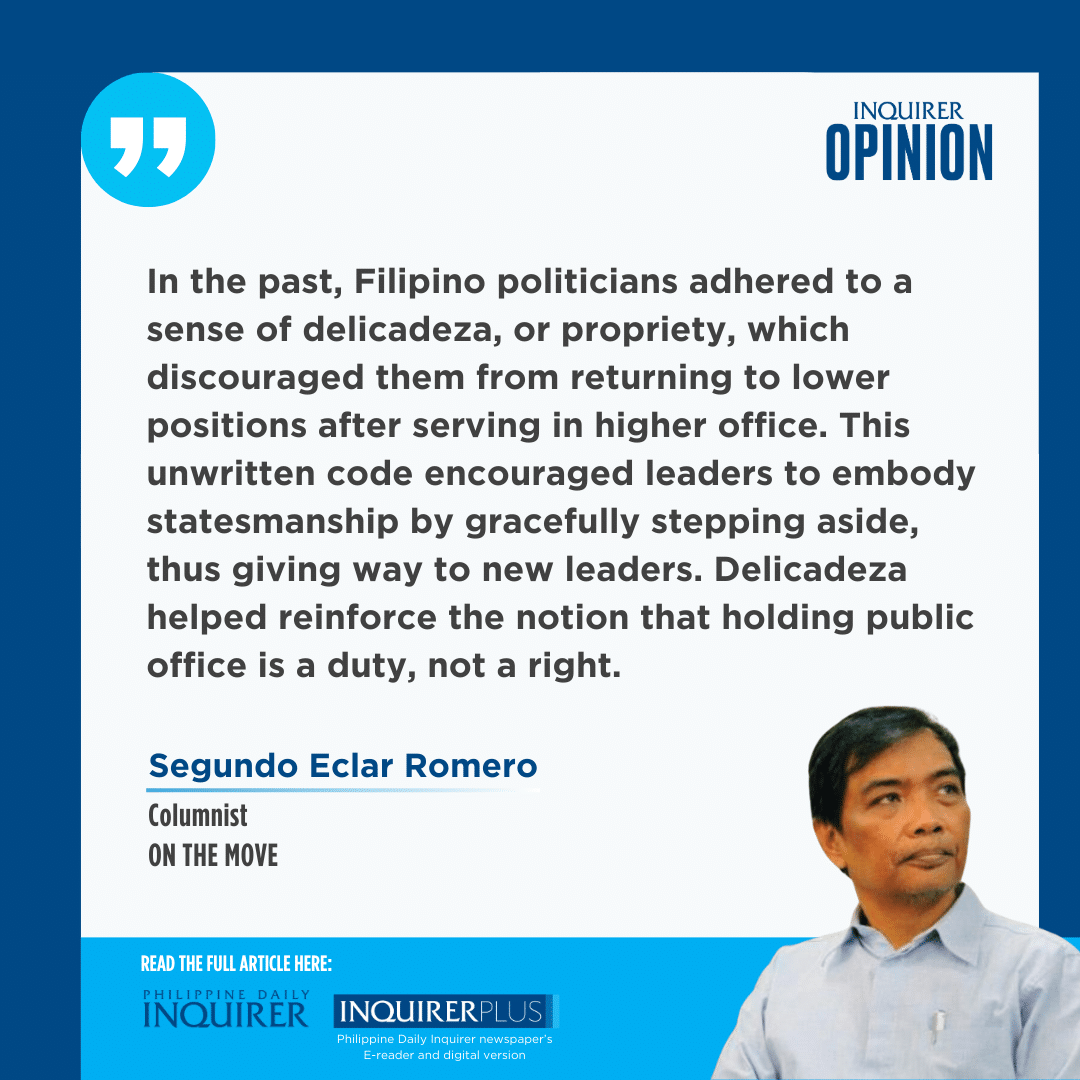Decline of statesmanship in PH leadership
In recent decades, the Philippines has witnessed a decline in statesmanship consciousness among its political leaders. This trend manifests as former high-ranking officials—from mayors, representatives, and senators to presidents—attempt to remain in the political spotlight by seeking lower positions after reaching their constitutional term limits. This practice, while legally permissible, reflects a shift away from the once-esteemed ideals of “delicadeza” and statesmanship that prioritize national interests over personal political gains.
The roots of this phenomenon trace back to Gloria Macapagal Arroyo, who, after serving as president, ran for and won a congressional seat in her home province of Pampanga. Her decision to “downshift” from the presidency to the House of Representatives broke with a tradition of retiring from elected office after reaching the highest levels of government. Former president Joseph Estrada followed suit, transitioning from the presidency to run for mayor of Manila. More recently, former president Rodrigo Duterte announced his candidacy for mayor of Davao City, a position he held before ascending to the presidency.
These examples highlight a concerning trend: politicians clinging to power at various levels, effectively maintaining influence through successive positions. Such moves can skew democratic competition, as former national leaders wield disproportionate influence and resources compared to their opponents. Their national stature grants them an advantage that can overshadow the competition and influence voters who may perceive their candidacies as a continuation of their leadership at a national level.
In the past, Filipino politicians adhered to a sense of delicadeza, or propriety, which discouraged them from returning to lower positions after serving in higher office. This unwritten code encouraged leaders to embody statesmanship by gracefully stepping aside, thus giving way to new leaders. Delicadeza helped reinforce the notion that holding public office is a duty, not a right, and that leadership should be driven by service to the country rather than personal political longevity.
However, this unwritten rule has eroded, replaced by what some argue is a hunger for continuous political power and influence. This erosion raises questions about the integrity of public service and the nature of leadership. Leaders such as Fidel Ramos exemplified the dignified exit from politics, choosing instead to assume roles as elder statesmen, providing guidance, shaping public discourse, and representing the nation in global arenas without the need for an elected title.
Political recycling, as seen through the bids of Estrada, Arroyo, and Duterte, aligns with the perpetuation of dynasties and reinforces the concept of politics as a family enterprise rather than a public service. As political dynasties tighten their grip, it becomes increasingly difficult for outsiders to break into the political scene, reducing the diversity of leadership and curtailing effective representation.
In contrast to the enduring pursuit of electoral office, true statesmanship calls for leaders to transcend personal political ambitions and contribute to society from a broader platform. The late Albert del Rosario, who served as foreign affairs secretary, continued to influence Philippine foreign policy and national strategy through his leadership in think tanks and as an advocate for national interests. Similarly, Carlos P. Romulo and Salvador P. Lopez, while world-class diplomats and not politicians, transitioned to roles in education, becoming presidents of the University of the Philippines, where they shaped the institution’s commitment to nationalism and intellectual integrity.
Former senior associate justice Antonio Carpio exemplifies this rare breed of statesman. Following his retirement from the Supreme Court, Carpio has championed Philippine sovereignty, particularly concerning the West Philippine Sea, by raising public awareness and contributing to think tanks. His work, which emphasizes national interests over personal gain, is a powerful reminder of how former leaders can continue to serve their country without occupying an elected office. Carpio’s dedication to the rule of law and national advocacy, free from partisan constraints, epitomizes the statesmanship that is increasingly absent in Philippine politics today.
These figures exemplify a silent category of statesmen who wield influence without holding political office. Their work underscores the importance of nonpartisan contributions to national development. As former leaders, they wield a unique moral authority that can inspire future generations and promote a strategic vision for the country. The Philippines’ current damaged and desolate political landscape could benefit from cultivating such statesmen, who engage in critical national discourse without the constraints or interests tied to elected office.
————–
doyromero@gmail.com





















